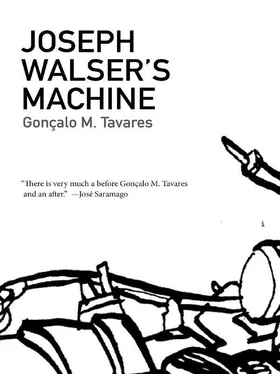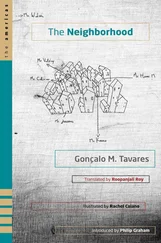“My dear Walser,” insisted Klober, “none of those events occurred in the way that they’re talked about, it’s impossible for any verbal description to evoke or explain organic events. Not even images can do it.”
The country was equipped with only two witnesses, each replete with equivocations: neither eyes nor language could hope to perceive even the minimal laws of existence. Two witnesses — eyes and language — that deceive.
Events occur alone, apart from us, uncomprehended; deep down, they are solitary beings — please excuse the ridiculous metaphor, but that’s precisely what they are: no event has ever been perceived to date. From the most significant, national events to the most discreet episodes of an individual’s life: we do not yet have a science that can truly perceive what happens or what has happened. The very precondition of the scientific method destroys the possibility of such objective observation taking place: that absurd idea, still defended, that science is universal, that it must be understood by all individuals in the same way. That meager rendering of causes and effects, those rows of numbers, the crowding in of explanations of some occurrence now reduced to numbers or letters. They stuff a series of individual, unrepeatable facts into a formula and present it to the entire world, saying: here is what happened to a certain man at a specific time and location, here is the summary of it, for all to understand. And, if possible, it is made into Law, or History.
In truth, we really understand very little, or nothing at all, because we reject the idea of an individualized science, of a science that is both geographically and temporally personalized. Since this individual science, although truly necessary, is useless to one’s country, to the world — assuming such things really exist — and since, furthermore, it’s dangerous, because nothing is more divisive than explaining the same event in different ways — and it would end up dividing the very thing that a nation would want to unite: Mankind — the idea of an individual science was, right from the start, made to seem pointless: it isn’t necessary, it’s superfluous, it’s harmful, it should be eliminated, and eventually, as a final measure, forgotten. “These days,” said Klober, “is there anyone who even remembers that anyone might have proposed the development of an individualized science, a science that always comes with a first name attached to it, and that doesn’t bother to engage with any other mode of reason?
“An individualized science,” said Klober, “an isolated explanation of phenomena is, indeed, urgently needed.
“Struggling by oneself is a laudable act, but it depends as much on the particularities of one’s strength as it does the particularities of one’s mind. A crazy person can struggle by himself all he likes, or a man devoid of all capacity to reason; likewise a man with a mediocre intelligence, let him toil away on his own. But a solitary explanation for phenomena requires a different altitude — let’s use that word — of intelligence. Every creative instinct begins with this primeval necessity, which the collective memory would have us forget: we’re creative because we want to find a solitary explanation, an individual explanation, an explanation that has no equal, that has no duplicate, that is impossible to follow — a selfish explanation, some will say, yes, a selfish explanation, of course. To go even further: it’s hateful: it’s an explanation that hates other explanations, that fights against them; but it doesn’t battle them merely to defeat these other explanations, no, it does it to defeat, vanquish, and eliminate the very men who harbor other solitary explanations! The solitary explanation, which is individualized science par excellence , at its most extreme, seeks to eliminate all other beings, because it hates them; it hates them simply because any other intelligence, any other possibility for solitude, are proof that we do not inhabit this world alone.
“There is only one true non-collective being, or asocial being, as it’s sometimes called. And this being isn’t someone who isolates itself, isn’t someone who runs off into the mountains or the forest, no, it is a being that kills other beings, the one who wants to kill all other ones so it can finally be alone: this is the true solitary being. The other ones, the ones that run off into the mountains or the forest, they’re not solitary beings at all: they’re cowards. The same goes for those who won’t leave their houses until the war is over. Don’t leave the forest until your life is over: this is the brilliant formula that some sages have used to resolve the question of existence! No, my dear Walser, you’re either ready to hate other people as much as possible or you should have never bothered to become strong in the first place, for, you see, you are not yet sufficiently individual. Hatred is the great emblem of Man, of his true particularity, his display of difference, his separation from other things. It is your hatred that gives you your name. Your mother, your father — those who provided you with your body — will only recognize you by your hatred. Let’s not allow ourselves to be deceived by morality or by the History of a country, which, deep down, are two identical forces: morality and History are just two ways that the collective, your country, tells you, or asks you, to cease to exist. Cease to exist, says the collective morality!
“And that is where war comes into play, as you must have already noticed,” continued Klober, “for war comes closer than anything to the true nature of Man, and that’s why people are so frightened by it. But this war, like all the others, still isn’t man’s ultimate truth, it still isn’t a procedure that’s capable of completely eliminating the possibility of deceit; the final war, the true one, far removed from the mere imitation before us, will be one in which each man battles against every other man, in which each man will make up the entirety of his own individual army; the true war, the precise war, the war that will finally demonstrate what it is to be an individual, that war, which has not yet taken place, which has barely been dreamed of, but which shall come, I’m sure of it, that war is one in which any two bodies that approach each other will do so out of hate. Any two people who approach one another will do so in order to kill — or else we will still have yet to see true Men.”
Not six months had passed since their brief, unpleasant conversation, when Clairie, on some flimsy pretext, asked Walser to pay a visit to her house, which, for a single woman, at once revealed an abrupt diminution of her sense of propriety.
The widow had taken down all the photographs of Fluzst. There wasn’t a single trace of her former husband.
“I’ve made some changes to the house,” said Clairie, “I wanted you to see it, Mr. Walser.”
Walser looked all around him. Clairie moved toward him.
“I hope you aren’t upset with me, Mr. Walser. I was too harsh with you that day.”
Clairie moved even closer to him. Walser whispered:
“Margha is expecting me.”
Clairie leaned towards Walser’s face and kissed it.
“I hope you’ll drop by often, the way you used to,” she said.
On his way home — after that first kiss from Clairie — Joseph Walser was thinking about something else. On some other plane of existence, we might say.
He was excited, but this excitement came from inside him. Walser couldn’t stop thinking about something that Klober had said in public once, in front of four or five men, with an expression on his face that made it seem as though he was taking great pride in having the courage to say such things:
Читать дальше












